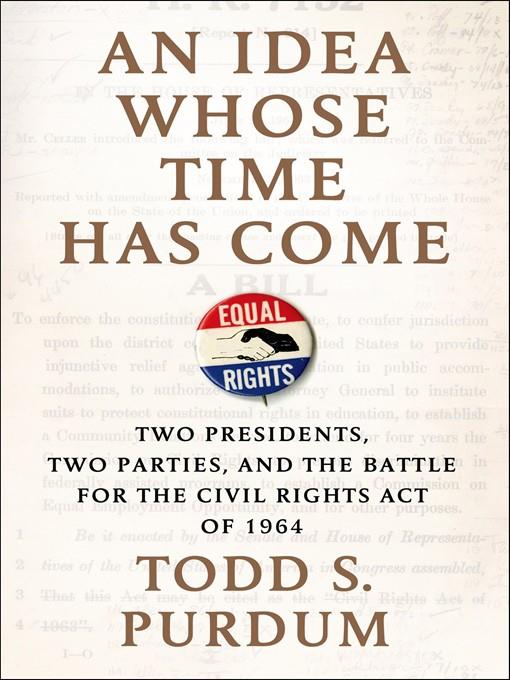
An Idea Whose Time Has Come
Two Presidents, Two Parties, and the Battle for the Civil Rights Act of 1964
کتاب های مرتبط
- اطلاعات
- نقد و بررسی
- دیدگاه کاربران
نقد و بررسی

January 20, 2014
The passage of the Civil Rights Act was a watershed moment of the turbulent 1960s, the culmination of vibrant grassroots activism that forced politicians to address pervasive racism in the United States. Journalist Purdum focuses the action, which he divides into three parts, at the political level. The first centers on the administration of J.F.K., who was uncertain that civil rights should be on his first-term agenda. But in June 1963, as nonviolent protesters increasingly encountered hostile crowds, especially in Birmingham, Ala., Kennedy announced his plan for sweeping federal legislation to end racial discrimination. The second part picks up during that summer and beams in on the House of Representatives, where politicians worked to draft a bipartisan bill that stood an good chance of passing. Kennedy’s assassination in November might have derailed it, but Lyndon Johnson embraced the legislation. He used his political savvy to move the bill along in the House, and then, in the final act of this drama, on to passage in the Senate. It was an important chapter in the Civil Rights movement, and Purdum’s keen eye for the wide cast of Capitol Hill characters keeps the story lively. Illus.

April 1, 2014
A riveting account of the hard-fought passage of "the most important laws of the twentieth century." The Civil Rights Act, Voting Rights Act and associated legislation of 1964 and 1965 had their births in the John F. Kennedy White House, as Vanity Fair and Politico contributor Purdum (co-author: A Time of Our Choosing: America's War in Iraq, 2003) notes. However, before they were passed, America was in many ways still the two countries of yore: "North and South, black and white, still separate and unequal." It does not speak well to Kennedy that he was sensitive enough to public opinion that he ordered Sammy Davis Jr. and his white wife, May Britt, to be removed from a White House reception on the very day that a federal commission released a report saying that black Americans lived under "a freedom more fictional than real." Purdum is at times unsparing in his assessments of the key players in the Kennedy administration who could never push the necessary legislation through for reasons of political calculus, arrayed against a powerful bloc of Southern Democrats who soon thereafter would become Southern Republicans. That switch, of course, owed to the arrival of Lyndon Johnson, uncouth and nakedly ambitious, who managed to make the enmity of Robert Kennedy as real as the hatred of the strongest segregationist--but who also bulldozed the opposition in what might well have been the most fraught political negotiations since the passage of the 13th Amendment. Purdum's warts-and-all account is both insightful and wholly mindful of the calculations that JFK and LBJ made at every step--the latter, for example, enlisting the despised RFK's help in case the bill failed so that he did not have "to shoulder the sole blame for its failure." Those battling the neo-Confederates and nullificationists of today will want this book to see how it's done. Readers with an interest in American history and the American promise will find it a must-read as well.
COPYRIGHT(2014) Kirkus Reviews, ALL RIGHTS RESERVED.

Starred review from March 1, 2014
Purdum (senior writer, Politico; coauthor, A Time of Our Choosing: America's War in Iraq) hails both the 1964 Civil Rights Act (officially H.R. 7152) and the 1965 Voting Rights Act together as the 20th century's most important legislation. Here he shows how the former transformed the United States. The author skillfully retraces the act through a legislative minefield of conservative-proposed Jim Crow amendments, an unsuccessful filibuster led by Senator Richard Russell of Georgia, and proffered liberal revisions that were unacceptable to Southern conservatives. Along the way, Purdum composes portraits of civil rights icons including Martin Luther King Jr., Presidents Kennedy and Johnson, Vice President Hubert Humphrey, Attorney General Robert F. Kennedy, and the NAACP's chief lobbyist, Clarence Mitchell. But his most important contribution is reintroducing readers to largely forgotten heroes--Rep. Bill McCullough (R-Ohio), Rep. Charles Halleck (R-Indiana), and Senator Everett Dirksen (R-Illinois)--all dedicated to racial equality and bipartisanship and who together marshaled the votes to ensure that the Civil Rights Act became the law of the land. VERDICT Political junkies and readers who enjoy modern American historical narratives will be gripped by this title that is an excellent companion to Gary May's Bending Toward Justice: The Voting Rights Act and the Transformation of American Democracy.--Karl Helicher, Upper Merion Twp. Lib., King of Prussia, PA
Copyright 2014 Library Journal, LLC Used with permission.

March 15, 2014
As we approach the golden anniversary of this landmark equal-rights and public-accommodations bill, veteran journalist Purdum painstakingly details how its passage came about. In short, not easily. Contributing editor of Vanity Fair and former White House correspondent for the New York Times, Purdum is well qualified to retell this epic from a fresh angle. The book is less for the specialist than for an audience that may be stimulated by anniversary-related publicity (or by recent congressional gridlock) to learn more. The Kennedy brothers' initial resistance to aggressive civil rights legislation may surprise some readers. Lyndon Johnson's immediate commitment to the cause, after assuming the presidency following JFK's assassination, shouldn'tothers have established this convincingly. The diligent efforts of Senators Everett Dirksen and Hubert Humphrey are recalled, but Purdum also emphasizes the crucial role played by Congressman William McCulloch (Republican). It is instructive to read about the hard work, passion, intense political negotiation, and collegial respect that went into the enactment of this historic legislation 50 years ago.(Reprinted with permission of Booklist, copyright 2014, American Library Association.)

























دیدگاه کاربران